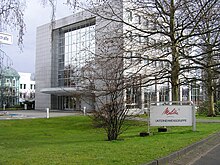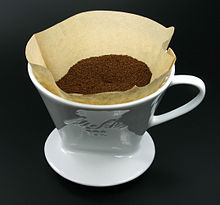Melitta
You can help expand this article with text translated from the corresponding article in German. (October 2024) Click [show] for important translation instructions.
|
 | |
| Company type | Private |
|---|---|
| Industry | Retail Coffee |
| Founded | 1908 |
| Headquarters | Minden, North Rhine-Westphalia, Germany |
| Products | Coffees, coffee filters, small appliance (coffee makers etc.) |
| Revenue | 1.325 billion € (2014) |
Number of employees | 3,736 (2014) |
| Website | www.melitta-group.com |


Melitta (/məˈliːtə/) is a German company selling coffee, paper coffee filters, and coffee makers, part of the Melitta Group, which has branches in other countries. The company is headquartered in Minden, North Rhine-Westphalia.[1][2]
It is named after Melitta Bentz (1873–1950) who founded the company after she invented the drip brew paper coffee filter (German patent granted 8 July 1908). Bentz later ran the company as a family business.[3]
History
[edit]
In 1908, Melitta Bentz, a 35-year-old woman from Dresden, Germany, invented the first coffee filter, receiving a patent registration for her "Filter Top Device lined with Filter Paper" from the Patent Office in Berlin on 8 July. She founded the company bearing her name the same year.[4][5][6]
In the 1930s, Melitta revised the original filter, tapering it into the shape of a cone and adding ribs. This created a larger filtration area, allowing for improved extraction of the ground coffee. In 1936, the widely recognized cone-shaped filter paper that fit inside the tapered filter top was introduced. The '102' became the most popular.[7]
Between 1941 and 1945, the Concordia Porzellanfabrik was used by Melitta.[8] In 1951/1952 and 1957/1958, the Porta-Keramikwerke J. Brauers in Barkhausen at Porta Westfalica, Germany produced ceramic filters for Melitta.[9] Langenthal Porzellan once also produced porcelain filters for Melitta.[10] The Porzellanfabrik Friesland, founded in 1953 as part of the German Melitta group,[6] and independent since 1991/1995, produced Melitta porcelain filters up to 2018. Since then, they continue to sell these filters under their own Friesland label,[11] whereas Melitta itself switched to produce these filters in China.
Melitta continued to develop new techniques to improve the shape, performance, material and production process of its filter systems. In 1989, Natural Brown coffee filters made from unbleached pulp were introduced, which kept unwanted by-products from leaching into the environment.[12] In 1992 Melitta developed an oxygen-bleaching process to produce white paper without chlorine.
In 1996, the Miele Group established the Dongguan factory as a joint venture with Melitta, which became fully owned by Miele in 2009.[13]
In 1997, Melitta developed a filter with Flavor Pores, microfine perforations that filter out unwanted sediment, particles and oils[clarification needed]. In 2002 Melitta added a second safety crimp to increase strength and durability. In 2007 bamboo Filters were introduced and the Flavor Pores filter was improved.
As of 2015[update] Melitta Group KG employed 3,300 people.[14]
In the 2019 financial year, the group's turnover increased by 10 percent to almost 1.7 billion euros.[15] The number of employees grew to 5654.[16]
In April 2020, Melitta announced that the company would be manufacturing nose and face masks as part of the COVID-19 pandemic. The masks consist of a three-layer fleece and are produced worldwide. Melitta donates the first million masks to healthcare facilities.[17]
Melitta USA
[edit]Melitta USA, headquartered in Clearwater, Florida, is part of the privately held Melitta Group of Minden, Germany.[1] Melitta USA is responsible for the sales and marketing of Melitta coffee filters, coffee, and non electric coffee systems in the USA.
Melitta USA's coffee filters are manufactured in Clearwater, Florida, and the company has a coffee roasting operation in Cherry Hill, New Jersey. The company Web site said in 2018 that it had been roasting coffee in Cherry Hill for more than 50 years.[18]
See also
[edit]- Easy Serving Espresso Pod
- Flavia Beverage Systems
- Tea culture § Germany
- Utah teapot, a 3D graphics computer model of a modern Melitta teapot used in graphics research and testing
References
[edit]- ^ a b Walsh, Alex (2010-03-25). "Filter Family". Business Observer. Retrieved 2020-02-21.
- ^ "Service addresses Archived 2009-04-03 at the Wayback Machine." Melitta. Retrieved on August 12, 2009.
- ^ Moses, Claire (2018-09-05). "Overlooked No More: Melitta Bentz, Who Invented the Coffee Filter". The New York Times. Retrieved 2020-02-21.
- ^ Melitta History Archived 2013-05-29 at the Wayback Machine, Melitta.com
- ^ "Total banal - genial!". Spiegel Online. 2008-05-29. Retrieved 2015-10-06.
- ^ a b Sander, Antje; Siems, Maren; Wördemann, Wilfried; Meyer, Stefan; Janssen, Nina (2015). Siems, Maren (ed.). Melitta und Friesland Porzellan - 60 Jahre Keramikherstellung in Varel [Melitta and Friesland Porzellan - 60 years manufacturing of ceramics in Varel]. Schloss Museum Jever (in German). Vol. Jever Heft 33 (1 ed.). Oldenburg, Germany: Isensee Verlag. ISBN 978-3-7308-1177-1. Begleitkatalog zur Ausstellung: Jeverland - in Ton gebrannt. (48 pages)
- ^ "Diese 15 Zahlen haben eine Geschichte: Kaffeefilter 102". BILD.de. 2015-05-25. Retrieved 2015-10-06.
- ^ Ruisinger, Karl. "Melitta: Geschirr-Nostalgie in Pastellfarben" [Melitta: Dish nostalgia in pastel colors] (PDF). Trödler (in German). Gemi Verlags GmbH. pp. 32–37 [34]. 180/94. Archived (PDF) from the original on 2024-09-10. Retrieved 2024-10-24. (6 pages)
- ^ "Melitta-Filter: Wesentlicher Unterschied" [Melitta filter: Main differences]. Der Spiegel (in German). Vol. 1962, no. 49. 1962-12-04. Archived from the original on 2023-02-26. Retrieved 2023-02-26.
- ^ Schweingruber, Andreas (2023) [2021]. "Melitta Kaffeefilter von Langenthal Porzellan" (in German). Archived from the original on 2023-02-20. Retrieved 2023-02-20.
- ^ "Vom "Melitta" Kaffeefilter zum "Friesland" Kaffeefilter" (in German). Friesland Versand GmbH. 2018-06-26. Archived from the original on 2023-02-28. Retrieved 2023-02-28.
- ^ Jolly, R. D.; Thompson, K. G.; Winchester, B. G. (1975). "Bovine mannosidosis--a model lysosomal storage disease". Birth Defects Original Article Series. 11 (6): 273–278. ISSN 0547-6844. PMID 100.
- ^ "Production sites". www.miele.com. Retrieved 2025-01-06.
- ^ "10 everyday things invented in Germany #5: The coffee filter". Deutsche Welle. 2015-07-15. Retrieved 2018-09-13. (Select 5th item)
- ^ "Melitta Geschäftsbericht 2019 - Home". Melitta Geschäftsbericht 2019 (in German). Retrieved 2022-05-11.
- ^ Hinweis in: Westfalenpost vom 18. August 2020, Seite Wirtschaft.
- ^ "Melitta stellt ab sofort Millionen Atemmasken her - Melitta Corporate Site". 2020-04-25. Archived from the original on 2020-04-25. Retrieved 2022-05-11.
- ^ "Company Information". Melitta. Retrieved 2018-09-13.
Further reading
[edit]- Oesterreich, Hans-Günther [in German] (1958). Written at Minden, Germany. Bentz, Horst Wolfgang (ed.). Geschichte und Geschichten um Melitta - geröstet, gemahlen und gefiltert - zum 50jährigen Bestehen der Melitta-Werke Bentz & Sohn in Minden [History and stories around Melitta - roasted, grinded and filtered - at the 50th anniversary of Melitta-Werke Bentz & Sohn in Minden] (in German) (1 ed.). Bremen, Germany: Melitta-Werke Bentz & Sohn / Druckerei Otto-Behrens. (2+70+2 pages)
- Hempe, Mechthild (2008). Written at Minden, Germany. Melitta Unternehmensgruppe (ed.). 100 Jahre Melitta - Geschichte eines Markenunternehmens [100 years Melitta - History of a brand company] (in German) (1 ed.). Cologne, Germany: Geschichtsbüro Verlag / Geschichtsbüro Reder, Roeseling & Prüfer GbR. ISBN 978-3-940371-12-6. (2+140+2 pages) (NB. There is also a French translation named 100 années Melitta - L'histoire d'une marque. Reportedly, English and Brazilian translations exist as well.)
- Kossack, Kristan (2005). "Betriebsalltag und Unternehmensentwicklung eines NS-Musterbetriebs im Spiegel seiner Werkzeitung" [Daily business life and company development of a model NS company as reflected in its company newspaper] (PDF). Westfälische Zeitschrift (in German). Vol. 2005, no. 155. Paderborn, Germany: Verein für Geschichte und Alterumskunde Westfalens. pp. 351–371. Archived (PDF) from the original on 2024-08-17. Retrieved 2024-11-02. [1] (21 pages)
External links
[edit]- Homepage of Melitta, Germany with international links
